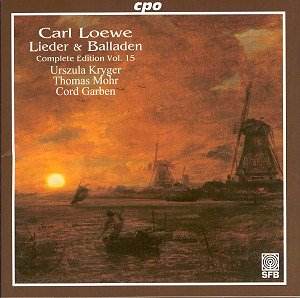Loewe is an important figure in the German song (lieder)
repertory. Practically an exact contemporary of Schubert (he was born
the previous year), we tend to think of him as a composer of the next
generation, because he lived a normal life span, until 1869.
Loewe wrote in excess of 500 lieder, as well as all
manner of instrumental and choral compositions, though it is for his
solo vocal works that he is remembered. The fact that this CPO issue
of collected songs is labelled 'Volume 15' tells its own tale.
Loewe was inspired by many poetic sources, and it is
possible to argue that he is at his best when he is most direct, laying
emphasis on a direct and song-like melodic line. And the Polish Ballads,
with which this recital begins, are nothing if not direct. In fact the
first of them, Mrs Twardowska, has an easy-going narrative style which
has an instant appeal. Urszula Kryger's performance catches this style
to perfection, though here as elsewhere she seems most at home when
there is a more extended melodic line at a slower tempo. In faster rhythmic
music she can sound unduly breathless.
The pianist Cord Garben is an experienced hand, who
always seems to select the right dynamic and the right tempo. In this
he and his singers are aided by the very pleasing CPO sound, ambient
yet detailed. It is therefore easy to follow the words, which are clearly
laid out in the accompanying booklet. In common with the other issues
in this interesting series, there are detailed introductory notes along
with full texts and translations, helping to make this disc an attractive
proposition for the specialist and non-specialist alike.
The baritone Thomas Mohr shares the programme with
Kryger, which provides a nice contrast for the listener. His voice makes
a satisfying impression, and as a light to mid-range baritone he is
able to colour the music, achieving insights into the subtleties of
the texts. And those texts include some particularly interesting poets:
not only Loewe's own favourite, Ludwig Uhland, but a Byron series too.
This CPO project is clearly a major undertaking featuring
a large corpus of songs, and it is a significant achievement. However,
I do wonder whether a more chronological approach, by opus number, would
have been wiser. For the collector wishing to find a particular song,
these compilations represent a real challenge, even if the themes do
make sense and the artistic balances offer a satisfying listening experience.
Terry Barfoot


